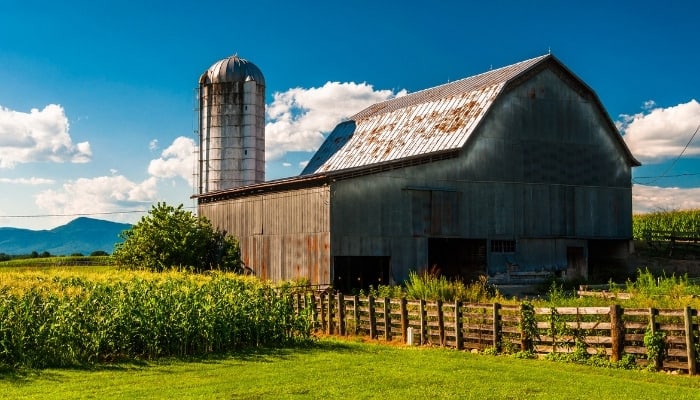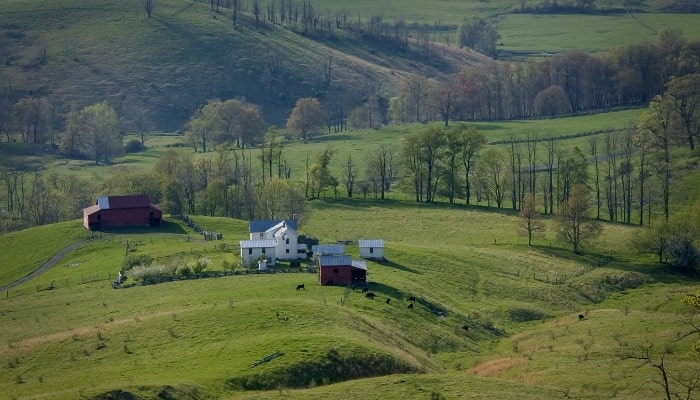If you have decided to try homesteading but are unsure of which state to settle in, consider the following factors.
You’re not alone, and believe it or not, Virginia may be worth your consideration.
Is Virginia good for homesteading? Virginia is a great state for homesteading. It has excellent laws regarding living off-grid, is an open-carry state, and allows a homestead exemption. Virginia is also a great place to homeschool children, work in the cottage food industry, and raise livestock as well thanks to relaxed regulations.
Read on below and discover all you need to know about homesteading in Virginia, including the laws, tips, resources, and more.
Homesteading in Virginia
Virginia has been a go-to state for homesteaders since before the earliest European-Americans started arriving and building farms.
Even the native Americans of early America preferred the rich and fertile lands of Virginia.
Below, we’ll discuss all of the most important aspects of homesteading in the state.
Virginia Homestead Laws
The Virginia homestead laws allow you to file a homestead deed that protects some of the equity in your personal property, wages, home, cash, and more.
Virginia also offers something known as the disabled veteran’s exemption, which reduces the liability of property taxes on the veteran’s primary places of residence.
The catch is this exemption is only available to certified veterans that are disabled or have a disease and are 100% unemployable.
Most counties in Virginia will even let you build pit privies, which is getting harder and harder to do in most states.
Virginia Livestock Laws
The livestock laws in the state of Virginia aren’t too restrictive when it comes to homesteading.
There is no limit to the amount of livestock you may keep on agricultural or rural residential land.
The catch to Virginia’s livestock law is that the owners of the animals are liable, legally, for damages caused by the livestock and may be fined if animals roam free.
However, unless you qualify as a farm under Virginia law, you may only have as many dogs and cats as your county allows. Most counties/cities in the state allow up to three or four pets per household.
Virginia Zoning Laws
If you hadn’t already started piecing it together, now you know: Virginia is one of the best states for homesteading legally, and their zoning laws prove it.
The zoning laws of the state make it more than possible for you to homestead one way or another nearly anywhere – that’s right, even right on the edge of town, and in some cases in urban areas too.
However, regular residential, commercial, and industrial zoning are, of course, the hardest zones to legally ratify your homestead.
Agricultural and rural residential zones are without a doubt the most preferred zones for a homestead in Virginia.
Virginia Cottage Food Laws
If you weren’t convinced yet, the evidence is about to keep mounting: Virginia is really one of the best states for real homesteading.
The cottage food law of Virginia allows you to start a business selling your homestead’s produce and products without an agricultural license or permit, though you’ll more than likely need a basic business license.
Even more impressive, you’re actually allowed to sell your goods directly to customers from your home with no limit.
That said, the only other places you are allowed to sell without additional licenses or permits are farmers’ markets.
One downside is that the state does ban the sales of cottage food across state lines and to restaurants, to grocery stores, and over the internet.
Virginia Homestead Exemption
You may designate up to $5K of your property as a homestead, be it a house, mobile home, or otherwise.
In addition, you may also file an additional $500 exemption for each dependent that lives on the homestead.
The maximum amount you may file for your Virginia homestead exemption is $10K.
Virginia Gun Laws
If you are 18 years old, you can buy and open-carry handguns, shotguns, and rifles without a license or permit.
You may not, however, carry weapons in certain public buildings, at parks, and special events in certain areas like Newport and Alexandria.
You will also need a CCW permit if you plan to carry concealed weapons, such as large knives or handguns.
On your own property, in your own home, and at your place of business, you may carry concealed without a permit.
Available Land in Virginia
We found approximately 30,000 parcels of potential homestead land for sale, and that’s just the tip of the iceberg.
From rolling hills to flatlands and waterfront property, the following online resources can point you toward your dream land in Virginia:
Virginia Land Prices
The main downside to homesteading in Virginia, as far as we can tell, is the price of the land. Compared to states like Wisconsin or Indiana, an acre costs five to 10 times more.
One acre in the states costs around between 50K and 500K. That said, the average price for an established farm in Virginia is close to half a million dollars.
A single acre may be acquired through a private deal or auction for as little as $1,000 or $2,000 if you search well enough, so don’t mark Virginia off just yet if money is the only downside you see.

Virginia Climate
Below are a few of the most important climate stats for Virginia:
- Annual rainfall: 44 inches
- Annual snowfall: 14 inches
- Grow Zones: 5, 6, 7, and 8
- Average temps for spring: 54°F
- Average temps for summer: 70°F
- Average temps for fall: 40°F
- Average temps for winter: 33°F
Virginia Growing Season
The average growing/gardening season in Virginia starts between the second week of March and ends toward the end of November.
Compared to many of the homesteading states which have just 120 to 160 days for growing crops, Virginia is a much better option with 180+ days of good weather for growing.
Number of Homesteaders in Virginia
The exact number of homesteaders currently active in Virginia is impossible to guess.
The number of farms, however, isn’t; there are over 43,225 farms registered in the state totaling over 7.8 million acres of farmland in the state.
There are more than likely several thousand homesteaders, possibly tens of thousands.
Can You Live Off-Grid in Virginia?
Another win for homesteaders in Virginia is the fact that off-grid living is completely legal in the state.
Unlike in stricter states, there are absolutely zero laws that prevent you from going completely off-grid and disconnecting your water, power, and other utilities.
Can You Homeschool in Virginia?
Homeschooling children on your homestead in Virginia is perfectly legal. In fact, it’s even easier than it is in some states.
To operate a homeschool in Virginia, you must either have a diploma, be a teacher, provide an approved curriculum, or enroll your student in a distance learning program.
How To Find Free Land in Virginia
There isn’t much to be found in the way of free land from the government in Virginia. The best you can do is find something affordable and file for homestead exemption.
Below are a few resources that may help point you toward some decent land:
Tips for Homesteading in Virginia
The best advice for homesteading in Virginia is to get there, get your hands dirty, and take advantage of all the opportunities that are possible.
Here are a few pointers to make the most of your homesteading experience in the state:
- Take advantage of the longer-than-average growing season.
- Make use of the tons of rain that the state gets each year.
- Sell cottage foods and goods straight from home.
- Appreciate the low property taxes and file exemptions.
- Enjoy the temperate climate and spend family time outdoors.
- Take advantage of the moderate sales taxes and buy in bulk.
- Sell electricity via net buyback programs and net metering.
- Run classes for other homesteaders to learn new skills.
List of Helpful Resources
Now that you have a better idea of what homesteading in Virginia looks like, here are a few additional resources that may help you on your journey:
- Virginia Homesteading/Farming
- Northern Virginia Homesteaders
- The Sustainable Homestead Institute
- Virginia Foundation for Agriculture, Innovation and Rural Sustainability
- Reynolds Homestead Forest Research Center
- Virginia Farmers Market Association
Related Questions:
Is West Virginia a Good State To Live Off-Grid?
West Virginia is one of the best states in which to live off-grid. The laws are relaxed, the price of living and of land is cheaper, and property taxes are low as well.
Additionally, the state doesn’t frown upon homesteaders and off-grid communities as much as other states.
Are Outhouses Legal in Virginia?
Believe it or not, outhouses are legal in one form or another in almost every corner of Virginia. Even at new homes, outhouses are legal, even if only for a temporary amount of time.
However, the state has very lenient laws on alternative waste systems such as composting toilets, pits, and outhouses.
Conclusion
Homesteading in Virginia is a pretty good choice if you’re choosing from areas in the eastern United States.
The land may be more expensive, but all of the laws are in favor of homesteaders, right down to the cottage food regulations and open-carry status of the state.
The bottom line is that Virginia has always been considered one of the best places for homesteading/farming and probably always will be.

